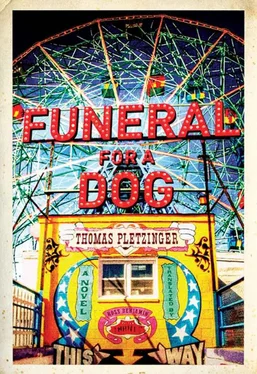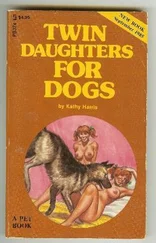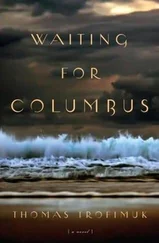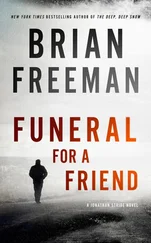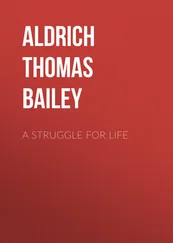WE REPORTED ALMOST everything to the police, David translated. We didn’t say anything about the dog and the gunshot, the Heckler & Koch is in the glove compartment of the pickup. Tuuli smoked a cigarette with the doctor, we signed our statements and were permitted to go. We’ll clear up the rest tomorrow, gringos , the police said, we’ll come by. The decision on Rua do Lixo has been made. Red is dead, says Felix, long live blue! On the murderers’ field the blue trio elétrico is playing merengue and forró again. I with the twenty-four hours of red and blue in my bones scarcely believe my eyes and ears. The garbage street wakes up as if nothing happened. Are the children yelling just as loudly as yesterday? Are the chickens clucking and the goats bleating? Are the men raising their hands in greeting? Oi, gringos? Are they raising their bottles? The bell of the church shack in time to all this? Are we supposed to believe in Macumba? And are those vultures up there in the sky? Lula is still lying in the back of the truck, and I with my first dead man in my bones sit next to the animal and swallow my tears. David parks the truck outside the door, we lift the heavy dog off the truck and onto the dried lambskin in the middle of the courtyard. Lula has closed his eyes, he isn’t barking or growling, his leg has stopped bleeding. I can’t go on. I wonder whether Lula will survive, I wonder how to wash off the blood without running water. I wonder whether the police will think we’re the murderers when the investigations continue tomorrow, when they discover the water conduit, when they remember our Heckler & Koch, when they find the great policeman Santos’s dog with us. I take the chain off Lula’s neck and hope that he goes away, but Lula can’t go away.
Flies circle the policeman’s dog and the bloody lambskin. Welcome to Seraverde, says Felix, and Tuuli replies, we should save the dog, two deaths on the first day are too much for me. Amputation? Felix asks with a laugh, right? Tuuli knows what to do, she studies medicine. She sends me to the goats, David to the liquor shacks and Felix to the truck. In the sickroom next to the kitchen she finds isopropyl alcohol and an old scalpel, in the office a roll of packing string. Felix gets the bolt cutter from the pickup, I milk a goat. David gets liquor at one of the shacks, he mixes it with my goat milk. Tuuli pulls Lula’s dried jowls to the side and pours the spiked milk between his teeth. Lula doesn’t resist, he swallows half a bowlful, then he lays his head on the ground. Tuuli rolls a cigarette and takes a sip herself, we pass around the enamel bowl. We tear the Sunday tablecloth of the Fundação Ajuda de Nossa Senhora into fine strips. Then Tuuli stamps out her cigarette and asks for the belt from Felix’s pants, she fastens the drunk dog’s snout shut. Hold tight, she says. So we hold tight: Felix the hind legs, David straddles the animal and clasps the intact foreleg. I hold Lula’s head in one hand and the injured leg in the other, I can see the white bones in the wound. Tuuli now ties off the leg above the knee, come on, she says, as she tightens the tourniquet with all her might, come on, and Lula opens his eyes. Only a little bit more blood comes out. Lula doesn’t move. He doesn’t move when Tuuli cuts into the healthy fur over the wound and opens the flesh. He doesn’t move when she severs the sinews and the bones lie bare. Lula doesn’t flinch when she waves away the flies and disinfects the bolt cutter. He doesn’t tremble like David and he doesn’t clench his teeth like Felix when Tuuli clamps through the bones with two cracking movements. Lula and I don’t look away, his eyes are wide and glassy. With Lula’s head in my hands my vision blurs. The tears I managed to swallow before are dripping on the dog, into his face, into his eyes. Tuuli pours isopropyl alcohol into the wound and binds the flaps of skin with packing string, she bandages the stump with the tablecloth strips. Then it’s over, half of Lula’s left foreleg is lying on the ground. Let go, says Tuuli, standing up. Lula still doesn’t move. My first amputation, says Tuuli, and now she smiles. Then Felix throws up in the enamel bowl, which she holds out to him.
It’s already noon when I start the pump again. We washed Lula with drinking water, the lambskin we threw into the fire, followed by our bloody T-shirts and pants, then Lula’s leg. Tuuli is sitting next to the dog and smoking. At one point she changes the bandage. Lula is sleeping, Felix and David are lying in their hammocks. The stink of the diesel pump mingles with the smoldering lambskin and the blood. I’m waiting for the padre with his cap. Today is Sunday, and on Sunday the padre takes off his cap and reads three consecutive Masses, first on Rua do Lixo, then in Majada, lastly for the glue-sniffing children of Mimoso. Any minute now his Peugeot will pull up in front of the Fundação Ajuda de Nossa Senhora and honk, any minute he’ll want to eat with them, but no one has cooked. I’m sitting next to Tuuli and waiting for the police. We’ve burned what was left of the weed, but our fear remains. Why, I don’t know, and of what, I only suspect. I said everything I could say, I told them everything I understood, but still the fear is stuck in my bones. The motor is running, the pump pumps, and just as I’m about to turn off the motor, there’s a soft burble. I take Tuuli’s hand and point to the sound. Then comes more and more. The tower is still standing, the tower doesn’t even creak alarmingly, we hear the water gurgling into the tank. The pipes seem to be watertight. I run into the bedroom and wake Felix and David. The water, I say, the water! Felix gets the Heckler & Koch out of the drawer and fires into the sky, as if he wanted to shoot the fear dead from behind. Peace to the huts! he sings, war to the palaces! To the tower of Seraverde! he cheers. On the decisive Sunday in Seraverde, the day of district policeman José Santos Tourão Splitter’s death, the day of Lula’s greatest pain, the day of Tuuli’s first amputation, the day of her arrival in the lives of Dirk Svensson and Felix Blaumeiser, the diesel motor pumps the first water into the garbage street. We test the water fountain in the courtyard, we let the faucet run, we pour water on our faces, we try the shower and the shower works, we bathe in the first water of Rua do Lixo, we stand in the midday sun, we rinse the sleep out of our eyes and the fear out of our bones, we wash the blood off the doorstep and off the iron door, we give Lula a drink.
(Bar del Porto)
Mandelkern! Svensson’s loud knocking wakes me too early and much too fast, I must have slept less than an hour. Mandelkern? I become aware only slowly that I’m in Svensson’s house, on his lake: Svensson’s desk under the window, his books and pictures (the suitcase under the desk). I’m dizzy from not enough sleep and too much gin. Yes? I ask, and Svensson is immediately standing in the room and holding out one of his shirts to me, his voice too loud and too firm for the early morning:
Take your notebooks, Mandelkern, and come with me!
My first thought: the Astroland manuscript. Last night I opened the suitcase with Tuuli’s hairpin and unwrapped the packet, in it almost three hundred typed manuscript pages, the title page a photo of Astroland covered with scrawls. At first I turned the pages drunkenly, then I sobered up over the course of Svensson’s story. After the first third I could concentrate better and read until the candle had burned down, then read on in the moonlight, it didn’t rain all night. I read Astroland through from beginning to end like a child under the blanket. I couldn’t stop, even though I was tired, even though the manuscript isn’t intended for my eyes (forbidden time, forbidden book). Astroland tells a love-triangle story, two men, a woman and a dog: Svensson, Tuuli and Felix. The dog is named Lua or Lula. Svensson has apparently tried to find words for the past years (1993–2003). His life story has turned for him into a sort of novel, maybe a roman à clef (I used Tuuli’s hairpin). The story takes place in Europe, North and South America, Svensson’s characters have endless possibilities and no obligations, they’re always on the move, tourists in search of a home, like those “nostalgia tourists” journeying back to their roots abroad (Elisabeth and me in 2003). Svensson’s story should have ended on the Italian side of Lake Lugano. That is, here.
Читать дальше
